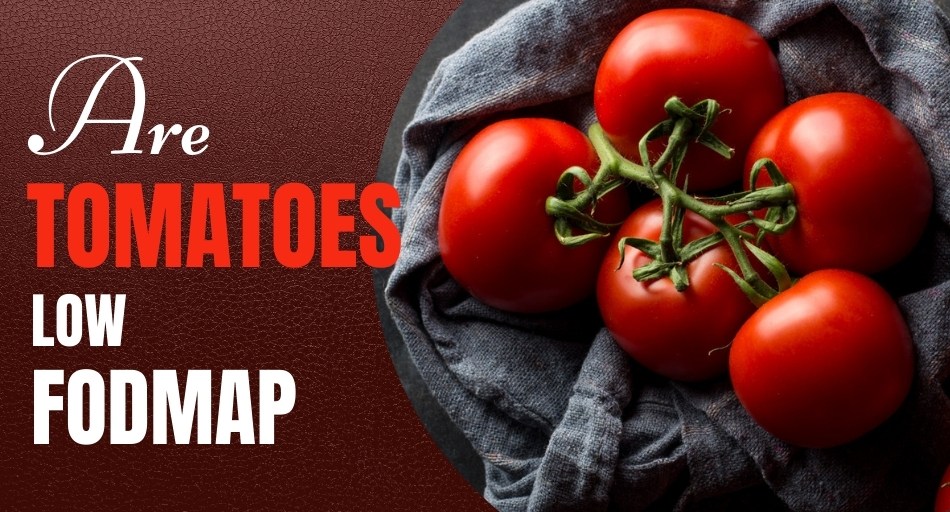If you were told you have to follow a diet low in FODMAPs, you might be overwhelmed. Sometimes it can be hard to figure out which foods are safe to consume and which aren’t.

Luckily, not all foods contain this type of indigestible carbs. So, you don’t have to completely eliminate all your favorite foods from your diet.
In fact, lots of foods are rich in important nutrients that your body needs, and they don’t worsen your IBS symptoms.
Let’s look at tomatoes, for example. Are they FODMAP-friendly? Or is this common ingredient not allowed on a low FODMAP diet?
Table of Contents
Are tomatoes low FODMAP?
Luckily for tomato lovers, this fruit is low FODMAP-friendly. It doesn’t contain too many indigestible carbs in a single serving, so it can be consumed by people with IBS and other digestive system issues.
What’s more, tomatoes are a source of various nutrients, including vitamin C, vitamin A, potassium, and manganese.

They also provide you with a lot of powerful antioxidants, so eating them can reduce your risk of various chronic diseases.
How low in FODMAPs are tomatoes?
As long as they’re consumed in standard servings, tomatoes are very low in FODMAPs.
They do contain fructose, which is considered a type of FODMAP, though. But if you consume them in small servings – about one medium-sized tomato in one sitting – you won’t intake too many indigestible carbs.
The same goes for yellow, orange, and green tomatoes. So, you can alternate between these varieties without worrying about getting too many FODMAPs.
Should you eat tomatoes on a low FODMAP diet?
If they’re consumed in moderation, tomatoes make for a great addition to a low FODMAP diet.
The best serving of tomatoes for people with IBS is about one medium-sized tomato or a handful of cherry tomatoes.

Larger servings can make you intake more FODMAPs, so you should avoid them, especially if your IBS symptoms are especially severe.
So, eating tomatoes comes with a wide variety of health benefits.
What type of tomatoes is best for people on a low FODMAP diet?
Fresh tomatoes of all kinds are very good for a low FODMAP diet. They do contain some fructose, but if you stick to a half-cup serving, you shouldn’t experience any unpleasant symptoms after eating them.
Canned tomatoes in servings of ½ cup (100 g) are also OK for a low FODMAP diet. If you consume more, though, you will ingest more fructose and glucose, which are FODMAPs. So, make sure to stick to the recommended serving.
When it comes to tomato sauce, it’s best to stick to a small two tablespoons (16 g) serving.
This is because tomato sauce, as well as tomato paste, tends to be highly concentrated. So, it contains way more FODMAPs than regular, fresh tomatoes.
So, generally, if you stick to the recommended servings, you can consume every variety of tomatoes.
Are sun-dried tomatoes low in FODMAPs?

Sun-dried tomatoes are a safe food for a low FODMAP diet as long as they’re consumed in moderation.
According to experts, the best serving of sun-dried tomatoes for those on a low FODMAP diet is about a tablespoon (8 g).
This serving won’t provide you with too many indigestible carbs, so you shouldn’t experience any unpleasant symptoms.
While this might seem like a small serving, sun-dried tomatoes are very high in sodium, which is bad for your health.
While it’s an important mineral, too much can increase your risk of heart attacks and strokes.
What’s more, most of the calories in sun-dried tomatoes comes from sugars. So, this serving is more than enough for any healthy, balanced diet.
Is tomato soup low in FODMAPs?
Canned and restaurant-made tomato soup tends to be high in FODMAPs. This is because they contain onions and garlic, which are two high-FODMAP ingredients.
So, people with IBS might want to make their tomato soup at home.
Avoiding garlic and onions is the best way to make your tomato soup IBS-friendly. Bone broth and beef stock are also OK for a low FODMAP diet, so you don’t have to avoid them.
Also, make sure to limit how much salt you add to your soup, as it can worsen some digestive system issues.
Are tomatoes good for you?
Even though most calories in tomatoes come from carbs, it doesn’t mean that this fruit isn’t healthy. In fact, a one-cup serving of chopped tomatoes contains 2.2 g of fiber (about 9% of your daily recommended need).
While this might not seem like a lot, the same serving contains only about 32 calories. So, calorie per calorie, tomatoes are a good source of fiber.
Most of the fiber found in tomatoes is insoluble, which means that it helps food move through the digestive tract and prevents indigestion.

Tomatoes also provide you with 38% of your daily need for vitamin C. Also called ascorbic acid, vitamin C helps lower your risk of heart disease, prevents iron deficiency, and boosts immunity.
Vitamin C also works as an antioxidant, so getting enough of it can lower your risk of various chronic conditions.
When it comes to antioxidants, tomatoes are particularly rich in them. The most abundant antioxidant found in tomatoes is called lycopene. It’s primarily found in the skin, so consuming unpeeled tomatoes is important.
Studies show that lycopene helps prevent heart disease, lowers ‘bad’ cholesterol levels, and reduces inflammation.
It may also lower your risk of certain types of cancer, such as prostate, lung, and stomach cancers.
Tomatoes also have beneficial effects for your skin. In fact, regularly consuming tomatoes has been shown to reduce your risk of sunburn and overall improve your skin condition.
Conclusion
In moderate servings, fresh tomatoes and all tomato-based products are allowed on a low FODMAP diet.
If you stick to these amounts, eating tomatoes shouldn’t trigger any IBS-related symptoms.
Plus, eating tomatoes can help you load up on important vitamins and minerals as well as powerful plant compounds.
So, this small and delicious fruit can aid in disease prevention and improve your health.
So, there’s no reason not to eat tomatoes.
Sources: Nutrition Data, Monash University, and Science Direct
